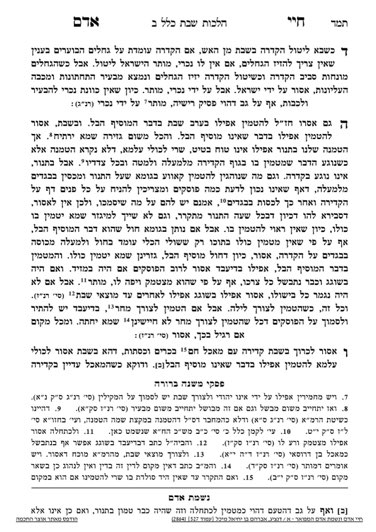We are continuing in siman 5, discussing the halachos of hatmana. The Chayei Adam now discusses the halacha of someone who violates the takana of Chazal and performs hatmana in an assur fashion.
The Chayei Adam writes that if one performs hatmana with something which is mosif hevel, if they knowingly transgressed the halacha, it is assur even bedieved according to the majority of poskim.
If they transgressed the halacha b’shogeig (either that they did not know the halacha or forgot it), if the food was already cooked enough that it would be served to guests, and the purpose of the hatmana was to improve the food even more (known as mitztameik veyafeh lo, see shiur S0045), it is muttar to eat it even on Shabbos. If it was not sufficiently cooked, and the purpose of the hatmana was to make the food edible, it is assur for anyone to benefit from it until after Shabbos. The Pischei Teshuva points that the Mishnah Berurah is more meikil, and holds that as long as the food has been cooked to maachal ben derusai, it will be muttar (which is a lower threshold than cooked enough to be served to guests, see more about this threshold in shiur S0042).
The Chayei Adam continues, and writes that in a case of extreme necessity, one can rely on the opinion which holds that the entire concern of hatmana only applies when a person performs hatmana at the onset of Shabbos for the purpose of consuming the item on Friday night. If a person is performing hatmana for the purpose of consuming the item on Shabbos morning, there is no concern of hatmana according to this opinion. This opinion holds that stirring the coals is not going to make a significant difference to the food if the food is anyways going to be cooking overnight, so a person does not have motivation to stir it. The concern of stirring the coals only applies if the person plans to eat the food at night, where there is a clear, direct benefit to stirring them.
The Chayei Adam cautions that one may only rely on this opinion in extreme bedieved situations, and may not rely on it on a regular basis.
Summary
- If one performed hatmana in an assur fashion:
- If it was done knowingly, the food is assur for anyone to eat until after Shabbos
- If it was a shogeig, if the food was already edible enough to be eaten (maachal ben Drusai), it may be eaten. If it was not, it is assur for anyone to eat it until after Shabbos.
- In cases of extreme necessity, one may rely on the opinion that there is no issue of hatmana if the food is to be eaten on Shabbos day. However, one may not rely on this leniency on a regular basis.



